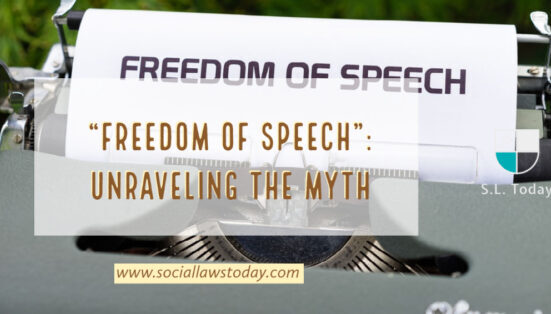Sanjay Rawat 15 August, 2020 12:58 pm IST
In a democracy, Freedom of speech and expression is of crowning importance, not because it is about speaking and expressing, but because it is about freedom. This freedom is envisaged in Article 19(a) of our Constitution for every citizen and has a very spacious and extensive judicial Interpretation. Our preamble bestows weight to this Article and provides a philosophical room for its interpretation by stating to secure every citizen’s liberty of speech and expression.
Although I spot a little ambiguity in the Preamble, that because its first paragraph commences with, ‘WE, THE PEOPLE OF INDIA’ and ends with, ‘SECURE IT’S CITIZEN’. Notably, who does this ‘WE’ stands for, and who would ‘SECURE’ the citizens? Is it all the Indian citizens or only those who had framed the Constitution for us or today largely the parliamentarians? The question is not who has the duty to secure the liberty of any individual but is, that who can. Can we, the citizens or the State? Judicially, it is lucid fixed that Fundamental rights can only be enforced against the state, therefore the state has the first and foremost duty to protect its citizen and feasibly we the people of India often has no say in it, beyond a certain point. Although being active and responsible citizens we can fight whenever our neighbour’s freedom gets infringed by someone but sad truth is, we can never prohibit that freedom from being attacked, however, the state can and should.
Grinding on innumerable cases, the Supreme Court of India has defined and redefined freedom of speech and expression on such various occasions. Today it’s settled that it includes Freedom of Press, Freedom of Commercial Speech, Right to Broadcast, Right to information, Right to criticize, Right to expression beyond national boundaries and Right not to speak or Right to silence is also included in the Right to speech and expression. Amongst all, I believe, the freedom of press is of paramount importance
Technology and Hijacked Choices.
In this twenty-first century our free will, opinions and ideas are no more ours, not anymore. The technological and scientific advancement has provided a gizmo, which can hijack humans by a composite knowledge of human psychology and good computing skills. Google knows us more than we know ourselves, our interests, thoughts, locations, insecurities, and a lot of other pieces. It follows your desires like a good companion and fulfills them. Their Intelligent hackers constantly frame a pattern for you. A simple pattern, supposedly, one day you click on a video or an article which praises, Narendra Modi, thence from the very next day your browser starts showing you hundreds of similar videos praising him, which would ultimately radicalize you and those who are Anti-Modi, you would consider them your own enemy and vice versa. Ponder upon, how much of your thoughts are provoked and stimulated by the technology you possess? Your will is always seized, they manipulate us whichever way they want. They can not only predict our choices but also re-engineer our feelings.
Therefore in the middle of this extreme scientific predictability, to protect the liberal idea of free will, where we believe that human choices should be his own and not manipulated, the press and media play a paramount role. Not journalism but Free and independent journalism has to be the fourth pillar of our Indian democracy. Approximately 80% of our countries population gets convinced and influenced by what is shown to them, they have no time to ask why, how or what. A common man is a busy man, He is ready to eat anything the media and journalists serve.
Judicial Views: Freedom of speech
Our judiciary has always been prudent against the evil of not having a competent and independent press, consequently upheld the liberty of the press in various foundational Cases such as the case of Romesh Thappar v. State of Madras (AIR 1950 SC 124), where Patanjali Sastri, J. observed that- ‘‘Freedom of Speech and Press lay at the foundation of all democratic organizations, for without free political discussion, no public education, so essential for the proper functioning of the process of Government, is possible’’, Bennett Coleman and Co. v. Union of India,(AIR 1973 SC 106), where the order which fixed the maximum number of pages, was struck down by the Supreme Court of India holding it to be violative of the provision of Article 19(1)(a), or the case of Brij Bhushan v. State of Delhi (AIR 1950 SC 129) in which the validity of order imposing pre-censorship on an English Weekly, on all the matters and news and views about Pakistan, including photographs, and cartoons, on the ground that it was a restriction on the liberty of the press, was struck down by the court.
Since Independence Indian government has infringed the right of free speech and expression on various occasions but earlier it was a newbie, the government had less precedential knowledge about their exact power and duties but today, 73 years later it is expected that India is a mature democracy, we should behave like one.
Constitutional Restrictions on freedom of Speech
When I look at the Present scenario, I get disheartened, where the judiciary has, without failing, jammed many lacunas yet the government remains rigid and incompetent while determining the freedom of speech of any individual. Today, your speech is free until it transgresses the government’s idea of free speech. The government has various hidden hammers to dismantle your right to freedom of speech and expression. Article 19(a) of India’s constitution guarantees the right “to freedom of speech and expression.” However, the constitution also allows the government to limit freedom of expression “in the interests of the sovereignty and integrity of India, the security of the State, friendly relations with foreign States, public order, decency or morality, or in relation to contempt of court, defamation or incitement to an offence”. Then further there is sedition. In order to curb revolution, the British made sedition a crime in India in 1860. It remains. Section 124 of the Indian Penal Code states: “Whoever, by words, either spoken or written, or by signs, or by visible representation, or otherwise, brings or attempts to bring into hatred or contempt, or excites or attempts to excite disaffection towards the Government established by law in India shall be punished with imprisonment for life.”
Crisis: Freedom of speech
Today, very few independent media houses are left. Either large corporations own the media or ministers of different parties, Voices of traditional journalists have been quashed and coerced to leave the job. In 2020, Indian media stood 142 out of 180 countries in world press freedom Index, which is far negligible to what is expected from one of the largest democracy. In recent years innumerable journalists have been arrested, various books by eminent authors have been censored, sedition has been invoked against the youths restlessly and unreasonably.
The government argues that they leave it to the judiciary to decide whether or not they are wrong in any front but the contention remains, if in a democratic nation for anything and everything you speak against the government, you have to face judicial proceedings, ascertaining that you have done nothing wrong, then where does the essence of a democracy lie? A purposeful reading of sedition law enlightens the cause to reconsider it, any disaffection against the government drops a very vague and wide interpretation. Our claim to have the largest qualitative democracy is questionable, a 73 years old mature democracy. A democracy that is still being run by the colonial laws needs to reconsider itself.
Personally, a nation is simply a mechanical and artificial concept without human freedom. We had fought wars against exploitation and for freedom and still fighting at borders, freedom of humans and I believe between sagacious freedom and irrational nationalism, one should always choose the first one. British had exploited our poor people and our government can be seen on the same line. What has changed for a poor and uneducated man? Had it been a true democracy, everything would be different.


Leave feedback about this